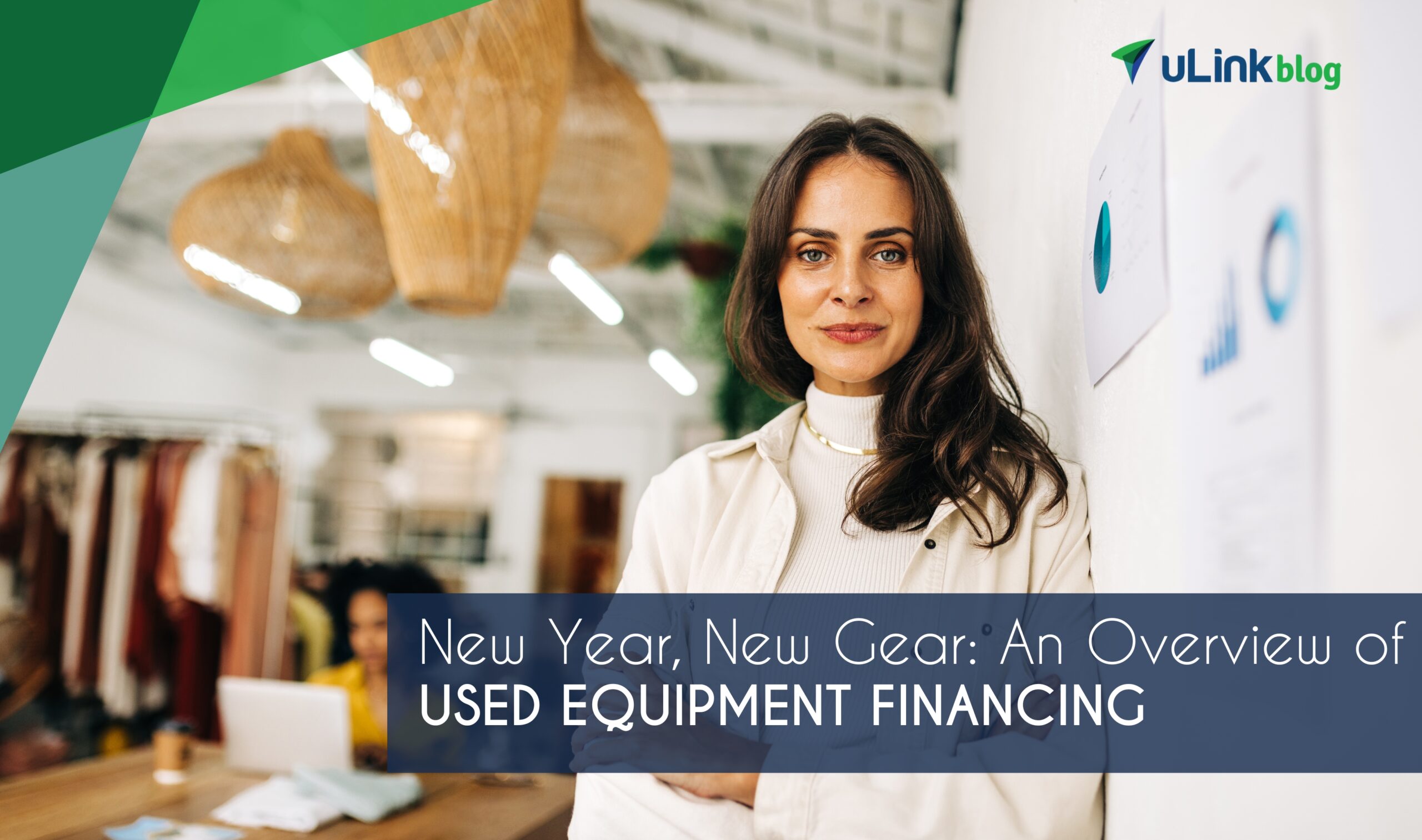
Can small business owners level-up their companies without breaking the bank?
Yes! The answer is used equipment financing.
Just ask Mariana, who runs a trendy coffee shop downtown.
After immigrating to the United States, Mariana followed her entrepreneurial dreams and opened a small business (SMB) storefront. It took several years for her reputation to grow, but her hard work eventually paid off, as she now runs the most popular cafe in town.
Business is booming, and to meet the demand, Mariana must upgrade her shop’s equipment. More specifically, she needs to purchase a commercial espresso machine valued at nearly $20,000.
As successful as her business is, Mariana doesn’t have the cash on hand to buy such a costly machine. After a bit of research, however, she learns that she can finance a used espresso machine for a fraction of the retail price.
Want to see how she did it? If so, you came to the right place.
In this article, we’ll reveal how used equipment financing ensures access to working capital, streamlines operations, and strengthens business credit.
We’ll also cover the importance of getting a certified equipment appraisal prior to signing on the dotted line.
Used Equipment Financing Defined
First things first: what’s used equipment financing?
In short, it’s a financial solution that helps SMBs acquire pre-owned assets (in most cases, without the upfront cost).
While new equipment financing is a viable option, used equipment financing can actually offer more compelling perks, such as lower monthly payments, faster approval rates, and meaningful tax benefits.
There are two main types of used equipment financing to consider: loans and leases.
As with buying a car, equipment loans lead to ownership at the end of the financing term, while equipment leases enable an extended rental of the machinery.
Choosing between the two options depends on your short and long-term goals.
For example, restaurateurs may choose equipment loans so they can enjoy true ownership of their appliances. Conversely, a gym owner might favor equipment leases to continually upgrade their workout machines.
How Used Equipment Financing Works
Whether you pursue a loan or a lease, used equipment financing generally incorporates three steps. You:
- Select a lender through your bank or credit union, a fintech lender, or a niche equipment financing company. For example, Mariana found an online refurbished coffee machine lender to help make her purchase.
- Choose your equipment and negotiate the asking price. Be sure to incorporate any transportation, setup, tax, and titling costs into the final amount.
- Complete the credit application to obtain approval and lock in the best possible rate.
Used equipment appraisals are also vital, as we will discuss in a moment.
Five Benefits for SMBs
Thanks to the digital economy, you can finance almost any kind of used equipment.
Whether you need restaurant appliances, exercise machines, medical equipment, semi-trucks, or new office furniture, you can leverage amazing deals to fuel your business’s future.
Beyond optionality alone, there are five tangible benefits of used equipment financing.
1. Cost Savings on Purchases
Used equipment financing dramatically minimizes your outlay.
Rather than paying a fortune for new machinery, you can enjoy high-quality secondhand equipment with no loss in performance.
“New” is always tempting, but it’s rarely worth the price tag—especially when used equipment financing is so effective.
Better yet, by saving money on purchases, you’ll have more resources available to invest in other areas of your company.
2. Slow Depreciation Rates
Used equipment financing can do more than save money upfront.
It can also promote greater value retention over time, as your machinery has already undergone its most dramatic depreciation before you finance it.
After all, new machinery depreciates upon its initial use— just as a car loses 20% of its value in the first year of ownership.
Also, with used equipment purchases your business could qualify for several major tax deductions (per Section 179 of the IRS tax code). These savings can further mitigate equipment costs and provide additional cash flow to power your small business.
As always, be sure to chat with a tax professional about any potential deductions prior to signing a financing agreement.
3. Flexible Financing Terms
Used equipment financing terms aren’t just affordable—they’re flexible.
By accessing multiple loan and lease options, you can find the best fit for your financial needs.
For example, you can ask your lender to set lower monthly payments by extending your repayment period. Or, you can request a fixed rate to help guard against inflation.
By promoting customization, used equipment financing helps inspire financial peace of mind.
4. Quick Acquisition Process
Debating between new or used small business equipment financing?
Here’s another important component to consider: used equipment financing frequently delivers a faster approval rate.
In fact, providers like Beacon Funding and Landmark Financial Corporation both approve credit applications within 24 hours.
That means less time fighting for a good deal, and more time boosting your small business.
5. Strengthened Business Credit
Looking for new ways to grow (or establish) your business credit?
Used equipment financing can enhance your business credit profile in powerful ways.
In fact, even if you have enough cash available to make a new purchase, used equipment financing could offer more benefits in the long-run.
After all, when you consistently make monthly payments on time (and in full), you enhance your standing with the three major business credit bureaus.
Plus, while down payments are common with used equipment financing, some providers—including Oakmont Capital Services and Crestmont Capital—don’t request money up front.
This can help you preserve your company’s cash flow while enjoying your upgraded equipment.
General Requirements
Though most SMBs can access used equipment financing, there are a few application requirements you can expect to encounter.
1. Credit History
Whether you choose a traditional bank or an online provider, used equipment financing involves a credit check.
As with other types of business loans, the lender reviews your credit history to gauge your payment consistency—the primary factor in your credit score.
Generally speaking, the higher your credit, the lower your financing rates.
However, even if your credit score falls below 600, don’t worry. Some vendors, including Global Financial, provide up to $1 million in equipment financing to applicants with credit scores as low as 500.
Triton Capital also offers used equipment financing to applicants with scores near 575.
2. Business Financial Health
Beyond your credit history, lenders also assess your overall business health.
This is where small business financial documents—i.e., your income statement, cash flow statement, and balance sheet—come into play.
Having these foundational documents well-organized and on-hand goes a long way to helping you secure the best overall deal. In fact, these statements can even offset the potentially negative implications of a low credit score.
Lenders may also ask to review your business plan for a more holistic view of your company’s track record, goals, and anticipated projections.
If you need to craft your own business plan, be sure to check out our complete guide.
3. Collateral
Depending on your business credit profile, some lenders may require specific guarantees before they provide financing.
For example, a lender might request collateral that they can claim in the event of default. Yes, the used equipment you’re financing technically is a form of collateral, but some lenders demand additional guarantees.
In some cases, lenders may even ask for “personal” guarantees, where the entrepreneur promises to accept individual responsibility if the business defaults.
If you’re struggling to gain approval, you might consider offering extra collateral (i.e. more property or a secondary asset) to secure financing.
You can also voluntarily increase your down payment to make your application more compelling. Since the average down payment hovers between 10% to 20%, offering 25% or higher could be seen as a winning gesture.
Remember that while the upfront expense may hurt, it will directly lower your monthly payments. Therefore, a higher down payment is ultimately a step towards your own financial freedom.
The Critical Role of Used Equipment Appraisals
Value is subjective, especially when it comes to secondhand equipment.
While retail price-tags are fixed, the value of a used product remains in the eye of the beholder.
That’s where equipment appraisals enter the picture: they independently determine the fair market value of used equipment.
And what is “fair market value?”
In this instance, it’s the objective value of equipment as determined by the open marketplace—or an accredited appraiser—rather than by a subjective individual.
Prior to making a purchase, it’s supremely important to hire a licensed appraiser who can deliver an accurate, unbiased, and defensible evaluation of used equipment.
It will save you money, reduce haggling with the seller, and ensure your business obtains the highest overall value.
Most reputable appraisers charge a fee of several hundred dollars per piece of equipment assessed. This is a standard practice across all industries.
Though the buyer is generally expected to cover the cost of the appraisal, the fair market value of the equipment will likely be less than the seller’s initial asking price. Therefore, the appraisal fee is often absorbed by overall cost savings.
To find a qualified appraiser in your local area, check out:
- The Association of Machinery and Equipment Appraisers (AMEA), a highly respected national organization.
- The American Society of Appraisers (ASA), an equally reputable collective. While many of their professionals work across the U.S., they also have a broad international presence.
Both the AMEA and ASA offer experts across multiple industries and disciplines. Given the breadth of their staff, you’ll be able to locate a fully qualified appraiser to review the specific equipment and machinery in question.
New Year, New Gear: Welcome to uLinkbusiness
With used equipment financing, you can supercharge your small business with high-quality products that don’t jeopardize your budget.
While enjoying cost savings, you’ll also be able to access more flexible rates, faster approval times, and significant tax benefits.
In short, used equipment financing helps you get the products you need without breaking the bank.
At uLinkbusiness, we’re focused on a similar mission.
We specialize in connecting small businesses with the world at large. How? By offering a seamless platform that allows you to make international B2B payments with ease.
Pay invoices and suppliers for purchases from countries abroad, process international payroll, buy inventory, pay international service providers, and much more.
Want to learn more? Reach out to get started.









